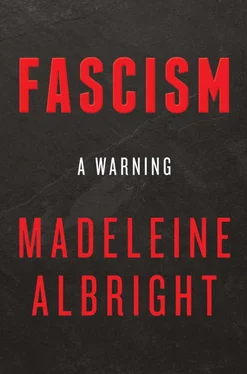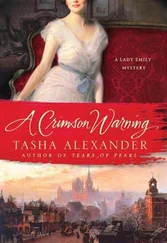McCarthy would neither have become a sensation, nor ruined the careers of so many innocent people, had he not received support from some of the nation’s leading newspapers and financing from right-wingers with deep pockets. He would have been exposed much sooner had his wild accusations not been met with silence by many mainstream political leaders from both parties who were uncomfortable with his bullying tactics but lacked the courage to call his bluff. By the time he self-destructed, a small number of people working in government had indeed been identified as security risks, but none because of the Wisconsin senator’s scattershot investigations.
McCarthy fooled as many as he did because a lot of people shared his anxieties, liked his vituperative style, and enjoyed watching the powerful squirm. Whether his allegations were greeted with resignation or indignation didn’t matter so much as the fact that they were reported on and repeated. The more inflammatory the charge, the more coverage it received. Even skeptics subscribed to the idea that, though McCarthy might be exaggerating, there had to be some fire beneath the smoke he was spreading. This is the demagogue’s trick, the Fascist’s ploy, exemplified most outrageously by the spurious and anti-Jewish Protocols of the Elders of Zion. Repeat a lie often enough and it begins to sound as if it must—or at least might—be so. “Falsehood flies,” observed Jonathan Swift, “and the truth comes limping after it.” McCarthy’s career shows how much hysteria a skilled and shameless prevaricator can stir up, especially when he claims to be fighting in a just cause. After all, if Communism was the ultimate evil, a lot could be hazarded—including objectivity and conventional morality—in opposing it.
DURING MUCH OF THE COLD WAR, THE SOVIET EMPIRE WAS AN overextended colossus, battling internal contradictions and driven more by paranoia than by any ambition for global conquest. That empire, however, was formidably armed, cynical, and cruel enough to merit a vigilant response from free societies. Thankfully, there were leaders on every continent prepared to argue for democratic representation, a strong defense, and respect for liberal norms. In Europe, these principles were wedded to a process of regional integration that eased border restrictions, eliminated tariff barriers, and developed a common currency. In the United States, administrations from both parties made major contributions through such measures as Eisenhower’s “Atoms for Peace” program, Kennedy’s Alliance for Progress, Nixon’s opening to China, Carter’s commitment to human rights, and Reagan’s support for democracy. These and other initiatives showed the fundamental difference between a state-run system that ignores individual rights and one that derives its power from the people.
The saga of the Cold War, however, was not quite as black-and-white as this duality suggests. In 1920s Italy and 1930s Germany, fear of Communism propelled Fascism’s rise. After World War II, the same fear gave life to McCarthy’s reckless allegations and to a willingness on the part of many democratic leaders to overlook repression when the governments involved were anti-Communist. By the early 1970s, the Nixon administration counted among its “free world” partners the dictatorships of South Korea, the Philippines, Indonesia, Pakistan, Iran, Saudi Arabia, Egypt, Zaire, Spain, Portugal, Greece, Argentina, Chile, Paraguay, Brazil, and all of Central America except Costa Rica—an embarrassing list.
I’m reminded of a dream that the aunt of a friend of mine had; the woman’s name is Cleo and she grew up in Kansas during the Great Depression. In the dream, she is lifted to Heaven when just a child. There, she is greeted by an angel who says, “Take my hand and I will show you to your new home.” The angel and Cleo stroll through Heaven’s shining streets, more radiant than anything the small and nervous girl had seen. However, instead of stopping before one of the lovely houses, they keep walking, then walking some more. The lights begin to dim, the houses are smaller now and the streets not so smooth. Finally, they arrive at a tiny hut near the edge of a dense forest with just enough light to see. Cleo asks, “Is this my new home?” The angel replies, “I’m afraid so; you were just barely good enough to get in.”
During the Cold War, many governments thought it sufficient to define themselves by what they were against. When the Berlin Wall fell and the Iron Curtain parted, mere anti-Communism was no longer the credential it had been. To win respect, governments would have to aim higher than “barely good enough.” That, one might hope, would prove welcome news.
Eight
“There Are a Lot of Bodies Up There”
TEN WEEKS AFTER THE DEATH OF FRANKLIN ROOSEVELT and less than two months subsequent to the German surrender, President Harry Truman flew to San Francisco to address representatives of the newly founded United Nations. The message he conveyed was one of profound optimism and hope, but included a word of caution. “Fascism did not die with Mussolini,” he warned. “Hitler is finished, but the seeds spread by his disordered mind have firm root in too many fanatical brains. It is easier to remove tyrants and destroy concentration camps than to kill the ideas that gave them birth.”
Foremost among the ideas Truman referred to was the belief that one’s own nation has attributes and rights above all others. The aggression shown by Tojo’s militaristic Japan, Mussolini’s New Rome, and Hitler’s supposed thousand-year Reich could all be traced, at least in part, to the unbridled nationalism of those countries’ leaders and followers. The world—East and West—had paid an unconscionable price to withstand the folly unleashed by their “fanatical brains.” However, this did not mean that as history moved from hot war to cold, the Soviet Union and its adversaries would view nationalism in the same light.
In Communist theology, preoccupation with national identity is a mortal sin, an obsession devised by the rich to distract the proletariat and prevent it from asserting its own interests. In this view, the nurturing of ethnic pride is little more than a tactic for dividing workers, persuading them to don opposing uniforms and slaughter one another for the benefit of arms manufacturers and banks. Thus, Communist regimes, especially in diverse societies like the USSR and Yugoslavia, banned the public display of nationalist sentiments. In the non-Communist world, however, nationalism is often thought to be a basic human instinct that becomes dangerous only when taken too far. Ordinarily, it is manifested in benign ways. For example, as a child, I marked Czechoslovakia’s National Day by wearing a traditional dress and handing out flowers in front of the embassy where my father had his office; that was my job.
As an adult, I have never concealed my pride in being an American, even to acquaintances who consider that kind of chauvinism unsophisticated. The identification we feel toward the places where we live or were born can give us an anchor in a chaotic world and strengthen our connections to family, community, and the generations that preceded and will follow us. At their best, such feelings are a celebration of culture and all that comes with it in the form of literature, language, music, food, folktales, and even the wildlife we associate with our homelands—the eagle in America, for instance, or in the Czech Republic what’s left of our lions, wolves, and bears.
There is, however, a tipping point where loyalty to one’s own tribe curdles into resentment and hatred, then aggression toward others. That’s when Fascism enters the picture, trailed by an assortment of woes, up to and including the Holocaust and global war. Because of that history, postwar statesmen established organizations to make it harder for deluded nationalists to trample on the rights of neighbors. These bodies include the United Nations—hence Truman’s speech—and regional institutions in Europe, Africa, Asia, and the Americas.
Читать дальше
Конец ознакомительного отрывка
Купить книгу












